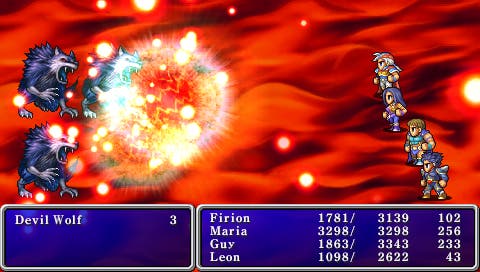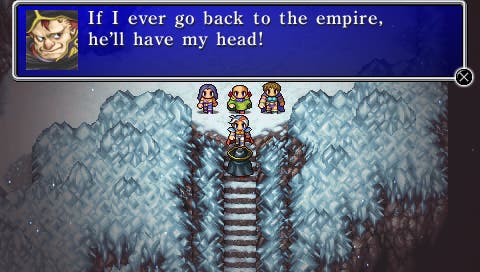Final Fantasy II
Number two.
'Own The Birth Of A Generation' urges the copy, somewhat awkwardly, on the back of the box. Setting aside the broken imagery (consider the acres of placenta you'd have on your hands) the phrase does manage to outline, with rare marketing frankness, the only reason players would be interested in buying this, the latest overhauled re-release of the second Final Fantasy game.
Of course, the chances of finding a gamer interested in owning Final Fantasy II out of historical curiosity who is simultaneously yet to actually play the game might be more problematic for Square-Enix. Once upon a time this was a tricky title to find outside of Japan, but nowadays, thanks to emulation and fan translation, not to mention re-releases on WonderSwan Color, PlayStation, various mobile phones and the GBA (in the form of Dawn of Souls) the chances are that any interested parties already regretfully own this primitive RPG.
Essentially this is a port of the PlayStation remake of the original Japanese Famicom game. The new dialogue and CGI cut-scenes introduced by the PlayStation version remain intact here, the novelty being yet another graphical upgrade. Unlike the recent DS remake of Final Fantasy III this update is purely 2D, boasting pin-sharp pixels spread across lush parallax backgrounds. The visuals are indistinguishable from the first Final Fantasy Anniversary - no bad thing as both games are bright, pretty and engaging, albeit within tight nostalgic boundaries.

But sadly this is about where our compliments dry up. When a classic film is remade it usually undergoes, for better or for worse, a reworking of dialogue, ironing out of problems and a contemporising of detail and form to bring to fresh life what has become outdated or over-familiar. But there is no such creative overhaul for Final Fantasy II. While the GBA title Dawn of Souls might have rounded off some of the original game's sharper edges, many of the terrible design decisions that characterised the Famicom title are re-presented here.
Principal amongst these is the oft-derided levelling system that keen JRPG fans will recognise from lead producer Akitoshi Kawazu's later games in the Romancing Saga/Saga Frontier series. The game does not employ the conventional character-levelling system but instead sees characters' stats and proficiencies increase according to their actions taken in battle. At first glance this is a good idea. Your characters start out as blank slates, able to equip any weapons and armour while free to learn any spells that take your fancy. It's through repetition of moves they improve in their chosen offensive/defensive emphases and so you begin to chisel out an individual and unique party for yourself.
However, in reality the system is broken almost beyond repair. As characters can only increase their hit-points through being hit (rather than when they level up) you're forced to turn your units against one another to before healing them with another party member to increase their stats. As boss battles can be very difficult, fighting amongst your team isn't optional to success (unless you faff about shifting the team's formation so that each team member gets targeted by enemies evenly and then grinding) and so battles become a wearying chore.

The story lacks nuance and complexity but that doesn't mean you won't need to pay attention. As the game lacks a quest log it's easy to forget what you're meant to be doing next, particularly if you pick up the game after a few days away. In addition to the levelling system the game tries another innovation that failed to catch on with the wider crowd. During conversations with characters some words will be written in red text. A quick button press and you're able to learn this key word and then use it as a conversation point when approaching other NPCs - an extremely basic interpretation of how conversation trees are handled in old LucasArts adventures. But rather than add depth and interest to NPC conversations, this simply makes the simplicity of the game's narrative logic flow all the more obvious.
These factors combine to make the game more of a historical curio than a game anybody would want to play for fun in 2007. While much of the game's flow is shared with later games in the series (and so is both solid and familiar) the broken ideas that combine with them sour the experience. As a result it's the weaker of the two anniversary games (the other being the first Final Fantasy game) released on PSP thus far. Indeed, seeing as the two games have traditionally been released in one package in recent years it seems a little unfair of Square-Enix to separate them again for full-price releases here.
There are many videogames from the late eighties that have warranted a graphical overhaul and reprint to introduce younger players to their enduring qualities. But Final Fantasy II was a poor videogame in 1988 and no amount of spit and polish will perform the necessary shifts to its foundations to produce a good one in 2007. Let's hope beyond hope that this is the last time Square-Enix repaint and parade this game on yet another platform, especially when there are so many wonderful videogames in their vaults that do warrant contemporary attention.

